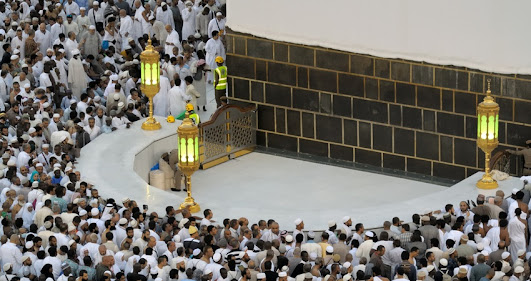They come mainly from the Middle East, Africa, and Asia speaking a gamut of diverse languages. All races, ethnicities, and economic classes are flooding Western urban centers. While some are unskilled laborers from rural villages, many are highly skilled professionals -- doctors, engineers, IT experts, accountants, financial wizards, and entrepreneurs. Some are refugees escaping war, religious persecution or oppression but a significant proportion of Muslims are migrating to the West for purely economic reasons, either as international students in Western universities or through professional migration schemes designed to attract the cream de la cream of the world.
The nature of capitalism in the West is that even religious non profit organizations are ecomically driven to solicit funding through donations. Unlike in Muslim countries where there are religious endowments (wafs) to fund religious activities, the religious institutions in the West are funded mostly through donations modeled on rules which originally goverened traditional Christian organizations. One local Islamic scholar described this public funding model as "beautiful" in terms of how many projects can be done through mutual cooperation.
Personally, I find some aspects of this model, which is rampant in immigrant communities, disgusting and sometimes against the Islamic ethos. When religious advice and services are influenced by donations, then they are not equitably dispensed in the community. As most immigrants are blindly focused on economic goals, they discount the importance of earning according to Islamic ethics, and encourage making wealth and properties based on riba and such exploitative economic practices that Islam explicitly prohibits. When such people gain influence through donations, neither is there blessing in the Islamic projects funded by impure wealth nor are the Islamic organizations able to cater to the needs of all the congregation equitably.
The waqf system needs to be established in the West whereby Islamic organizations become free from the addiction of perpetual fundraising. When Islamic organizations own properties and land which generate rent and harvest annually to fund Islamic projects there will be less need for perpetual fund raising.
How can Muslims in the West be leaders in astromony, history, research, etymology, social work, or a plethora of very interesting and fulfilling professions when everyone is expected to be a doctor, engineer, IT tech, or financial guru to make as much money as possible for influence and social status through donations? How can the best examples of humanity be so singularly money driven?
In medieval Christiandom, it was possible to purchase a certificate for Paradise from the Church for the right amount of donation. Likewise, we find Muslim elite financing their spiritual needs through donations, so it is possible for the rich to have a religious scholar recite the Quran beautifully for a terminally ill patient daily even if the patient does not try to perform salaat as long as they donate.
The concept of "pure" wealth and "impure" wealth was very clear even before the advent of Islam. When the Kaaba was reconstructed there was not enough funding to complete the whole structure with "pure" wealth so they did it without constructing the hateem (a semi circular adjacent area today). Yet Immigrant Islamic organizations have no qualms about the sources of their funds, just as Sir Sayyid Ahmed Khan had no remorse to go to the dancing girls to collect funds for Aligarh Muslim University to revive Islam in India as did the public fundraising campaign in Morocco to build a giant mosque in Rabat recently which collected donations from even prostitutes.
There is nothing wrong with being wealthy in Islam just as there is nothing wrong with a lack of wealth. Wealth can be inherited or it can be a by product of productive and socially productive activities. The richest man in human history, Mansa Musa of Mali was a Muslim. Abu Bakr Siddique (RA), Uthman Ibn Affan (RA), and Abdulrahman Ibn Awf (RA) generated tremendous wealth, but wealth was never in their hearts. It was in their hands to do good with. For them wealth was a blessing. It came to them through ethically and lawfully as a by product of their good works and they used it for more good works and thus it kept multiplying in quantity and blessing. They did not hoard it, like it is hoarded today, but kept circulating it. Thus unlike Chistianity, Islam does not advocate shunning wealth to lead a righteous life. Nevertheless, we need to realize that in some circumstances wealth can be a curse, and in such individual circumstances it might be wiser not to pursue it and there is nothing wrong with that either.
Musab Ibn Umair (RA) was from a wealthy Makkan family, yet when he was burried after Uhad his shroud was not enough to cover his whole body. For many Muslims, especially of our present materialistic era, wealth can be a test and curse. Did not the Prophet (SWAS) explicitly single out the pursuit of wealth as THE fitna specific for his Ummah?
Islamic organizations in the West need to realize the repercussions of their actions with respect to funding their projects. Rather than perpetual fundraising, it might be more fruitful to establish awqaf for long term funding and take care of the spiritual need of their congregation irrespective of their economic condition.
Islamic organizations in the West need to realize the repercussions of their actions with respect to funding their projects. Rather than perpetual fundraising, it might be more fruitful to establish awqaf for long term funding and take care of the spiritual need of their congregation irrespective of their economic condition.
In the long term, such steps might lead to a more balanced flourishing of Islam in the West, free from the influences of oppressive Muslim regimes, while being immune from the blind pursuit of wealth and social status of our times which is one of the main spiritual illness that humanity suffers globally.





